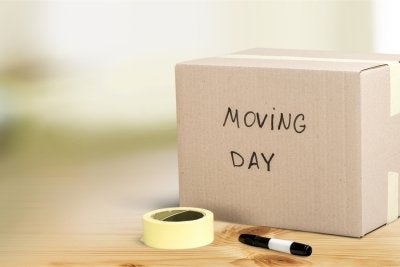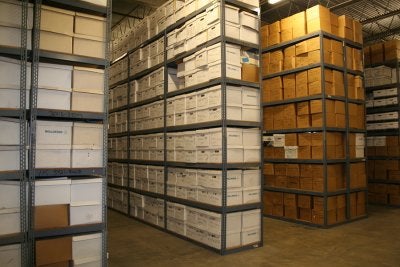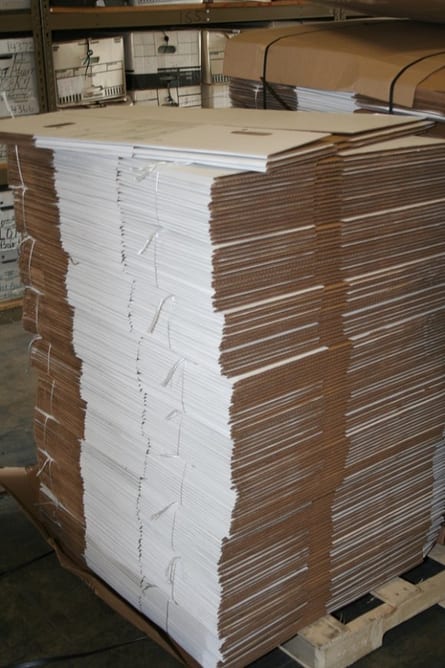-
How to Downsize Before Your Office Relocation
When you relocate into a new office space, you will have a fantastic opportunity to downsize your inventory and make sure that your business operations are as streamlined as possible. Downsizing will also help to ease the transition when you undertake your corporate relocation in NYC. With services from movers in New York City, you can decide what will go with you when you move, and which items will be discarded or donated to charity. If you are struggling to get started on your moving procedures, here are a few handy tips that will help you downsize before your office relocation.

Keep Your Employees Informed
In order to effectively downsize your inventory in preparation for corporate relocation, you will need to make sure that your employees are informed about your downsizing procedures. You may want to ask each of your employees to work on eliminating unnecessary items and paperwork from their desks or workstations. Starting the downsizing process early will also give your workers plenty of time to get ready for your big move.
Make a Detailed Inventory of Items
If you have not recently taken an inventory of all of the items that your business has in stock, now is the time to do so. As you are making your inventory, you will be able to decide which items will come with you when you move, and which ones are no longer necessary for your business operations. If you have not used an item for a year or more, it may be time to toss it out.
Consider Your New Location
During the downsizing process, you will also want to make sure that you carefully consider the space that you will have at your new business location. If your new office location will be smaller than your current space, it is important to make sure that you downsize carefully. If you are moving into a larger office, you may not be required to get rid of as many things as you prepare for your move, but be sure to still discard any items that your business no longer needs.
-
Choosing a New Location for Your Boutique
Location is an essential factor to consider when you are starting your own boutique. In this video from Shopify, you will learn about the importance of finding the perfect location for your retail shop. When you are planning a move in New York City , you will want to find a retail space that is located in a shopping district. By moving to an area that has lots of foot traffic, you can help your retail space to thrive.
When you are ready to move into your new boutique space, be sure to get in touch with a corporate relocation specialist. A team of professional movers will be able to safely transport all of your inventory to your new location. After you have moved into your ideal retail spot, you can look forward to having a thriving boutique business.
-
The Benefits of Off-Site Record Storage
Off-site storage and retention of files is very important to the health and function of your business. By creating and utilizing an off-site retention policy near New York City, your current location will have more room for expansion and storage. Your businessâ important documents will also be better protected and organized for future use. These are necessary features to keep your business running smoothly and more profitably. Continue reading to learn more about the many benefits your business will experience with off-site record storage.

You will have more space.
If you have a storage room or closet at your office location, then it is likely filled with several boxes of records. These records are rarely accessed, but according to certain rules and regulations, you need to keep them. Instead of continuing to use this area to store important documents, look for off-site record retention. Trusting your various files and documents with a professional record retention facility can free up a significant amount of space at your office location. This new space can be used for store expansion or for management purposes.
Your records are well-protected.
The longer that your important documents and files are kept at your store location, then the likelier that they will be damaged. Often, files are not protected correctly, which means they may become nesting material for mice or become destroyed from a roof leak. Instead of trusting that your current storage location is safe, trust your records to a document-specific storage facility. These areas have the necessary machinery, storage practices, and other techniques to keep your records well-protected while in retention.
Your records are organized and accessible.
Instead of keeping complicated records in boxes or filing cabinets, store them with a dedicated off-site record retention facility. These facilities can organize your storeâs paperwork and important documents so they are easily accessed and well organized. This is a necessary feature in case your business must present any of your documents for tax purposes or audits.
-
Why Your Business Needs Record Retention Policy
Whether you have a record retention policy in place or not, it is always good to have a reminder of why you need business record retention near New York City . By establishing a retention policy, your business will have organized access to all of your files in a secure location. Letâs take a closer look at why your business should have a record retention policy.

To Abide by Official Regulations
There are many state and federal regulations that state a business must have clear records. These records might be customer and business transactions, tax records, and employee records. Within regulations, some records need to be retained for a certain amount of time, such as tax records and employee files. Instead of keeping your businessâ files cluttered and unorganized in an office room, instate a retention policy that keeps your files professionally organized and out of the way. This will help your business to meet any regulations that it is subject to.
To Conduct Smooth Audits
No matter how often your company has an audit, whether internally or from an outside company, you want the process to go smoothly. Auditors must examine your office records to ensure that your business and employees are maintaining sound company policies. To help this process go as quickly and smoothly as possible, make sure all important documents and files are part of a strong retention policy. Your auditors should be able to access all files if and when they need them, making your audit process a smooth endeavor for everyone involved.
To Sort All Documents
Over time, your business has likely accumulated a wealth of documents, whether they are important, up-to-date, or simple pieces of scrap. By enforcing an official retention policy, you and your employees can sort through your files to separate recyclable files from the ones that must be kept. You can also use your retention policy when it comes time to purge old documents that you no longer need to keep. A sound retention policy will keep your business better organized so you can focus on your customers and vendors.
-
Organizing Your Documents for Storage
Important documents should be organized, filed, and cataloged before you place them into storage . Use this organizing opportunity to determine documents that you can discard and documents that you should retain in New York City.

Back up Documents Digitally
Before putting any important documents into storage, you must ensure that they are backed up onto a digital file. Your digital files should be well-labeled and organized within your computer system too. This backup filing system will protect your important documents in the event they become damaged or lost in storage. Ensure that your digital system is well-protected with password codes and other digital protection systems. This, in addition to a secure storage facility, will make sure that all copies of your documents are protected from potential thieves, as well.
Organize Documents by Need
As you prepare your documents for storage, take the time to organize your files by your frequency of need and their importance. This will help you find important files as you need them. For example, many tax files or employment paystubs do not need to be seen frequently. They are important and necessary, especially around tax season, but they do not need to be located toward the front of your filing cabinet or filing system. You can also use this organization time to determine files that do not need to be kept at all. Some important documents, such as credit card statements, are already kept online with their respective companies. You may choose to shred and recycle these files to create more storage room.
Catalog Your Filing System
In addition to organizing your files by need and importance, you should keep a simple catalog to help you find these documents. This catalog will be similar to a table of contents found in a book. Professional retention storage companies often have a barcode system to help catalog files and items. You may prefer to have a keyword system for your digitally-backed files.
-
Are You Ready to Rent a New Store Space?
If you have considered renting a new store space, there are a few ways to determine if this is the right time for a store relocation near New York City. Store relocations can make or break a company, and it all depends on where the company is moving.
As you can see in the short video, determining if this is the right time to rent may be based on where your customer base is and how much your company can afford to pay in rent. Many commercial rental properties charge based on square footage and the location. Determine how much space you needâthis square footage may also aid in hiring your moving companyâand where the right location is to reach your customers. Once you have located the right store space, and finalized your rental agreement, you can start making plans for relocation services.
-
Estimate Your Moving Costs with Ease
Before you start your relocation in New York City, you should figure out an estimate of your moving costs . By determining the general cost of your corporate relocation, you can better plan out your companyâs move.
Watch the short video for some tips on how to estimate relocation costs. The most important suggestion is to call multiple moving companies. Make sure the companies you call are experienced in corporate relocation and offer the services you require. Get all of the estimates in writing and start comparing. Do not choose the least expensive or most expensive option. Look for the services your corporate relocation will require and choose the moving company that is most qualified to offer that.
-
Tips for Choosing Records Retention
When looking for record retention in NYC , there are a few key elements you should look for to keep your documents well-protected. When storing your physical documents for record retention, corporate moving companies should offer full storage services. These services, such as climate control, will make sure your documents are protected against environmental issues as well as theft.
- Corporate moving and storage companies should employ software that labels and tracks all boxes and documents submitted for file retention.
- The software should maintain a full history of each item in storage. You can check the inventory online to be sure only approved personnel has opened a box or accessed an item within the box.
- Climate-controlled storage should be offered for all sensitive materials that require environmental control.
- A personal manager should be assigned to your account. You would receive quick and helpful information as you request it.
- Look for an experienced, insured, and licensed storage company, skilled in record retention and storage.

-
Getting Organized for Your Document and File Retention Services
If you are planning a home or commercial move and need to keep important documents safe, you may wish to employ the services of a company offering record retention in NYC. First, however, you will need to organize your papers carefully. Sort your invoices, receipts, and other miscellaneous documents into different categories. You may need to keep some documents for longer than others.

Keeping Important Documents Safe
Place any documents which are difficult to replace in a secure, fireproof box. Such documents might include passports; Social Security cards; birth, marriage, and divorce certificates; medical prescriptions; stocks and bonds; and wills. You should also make an inventory of all household or office goods and furnishings. Create a list of all your bank accounts, credit cards, and financial information. You should also ensure that you create a document listing all-important contacts, such as doctors and next of kin. Make sure you make a backup of all the crucial information on a memory key, portable thumb drive, or online. Provide a trusted friend or lawyer with a copy of all the data.
Keeping and Discarding Documents
Find out which documents you will need to keep and which can be safely discarded. Create a folder for invoices and receipts. When you do discard documents, do so safely, by using a crosscut shredder. This will help prevent identity theft.
Filing Carefully
Invest in good quality hanging and drawer files, or sturdy, expandable folders. Make sure you only use leak-proof boxes, to safeguard your files from possible water damage. File tax returns by year. You will need to keep all tax documents for six years, in case of an IRS audit. Use a lockable filing cabinet to keep important documents safe. Hanging file folders can help you to organize your documents. Divide them into categories, such as home, school, healthcare, car insurance, home insurance, and taxes.
-
What You Need to Know About Record Retention
 Developing a standardized procedure for records retention in NYC is crucial for every business. There are certain records that you may be required to retain by law, and others that you might just want to keep to make it easier to do business. Regardless of the purpose of your records retention, your records retention policy must be understood and followed by everyone in your company.
Developing a standardized procedure for records retention in NYC is crucial for every business. There are certain records that you may be required to retain by law, and others that you might just want to keep to make it easier to do business. Regardless of the purpose of your records retention, your records retention policy must be understood and followed by everyone in your company.To create a standardized records retention policy, you must determine which records you need to retain, for how long, and how they will be stored and accessed. Some records must be permanently retained, while tax records and business records can be destroyed after a certain period of time. You should consult with an attorney to determine how long you need to retain all of the important documents that pertain to your specific line of business.
Once you have established your records retention policy, you need to coordinate records storage and archive destruction procedures. If you use a secure storage facility that specialized in records retention, youâll need to create a complete inventory of your records storage. Records retention storage facilities also typically offer secure archive destruction services.
